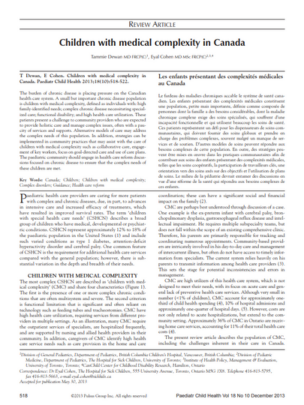Children with medical complexity in Canada
Governments and health care policy makers are trying to address the epidemic of chronic disease in Canada through primary care service reform, emphasis on patient-centred care, continuity of care and increased attention to the broader dimensions of health (29). Future changes in the health care system in Canada must account for provision of integrated care at both specialty institutions and community practices.
Author: Tammie Dewan, Eyal Cohen
Publication Date: December 10, 2013
Description: The burden of chronic disease is placing pressure on the Canadian health care system. A small but important chronic disease population is children with medical complexity, defined as individuals with: high family-identified needs; complex chronic disease necessitating specialized care; functional disability; and high health care utilization. These patients present a challenge to community providers who are expected to provide holistic care and manage complex issues, often with a paucity of services and supports. Alternative models of care may address the complex needs of this population. In addition, strategies can be implemented in community practices that may assist with the care of children with medical complexity such as collaborative care, engagement of key workers, focus on goal-directed care and use of care plans. The paediatric community should engage in health care reform discussions focused on chronic disease to ensure that the complex needs of these children are met.
Access: Free
Keywords: Canada, Children, Children with medical complexity, Complex disorders, Guidance, Health care reform



